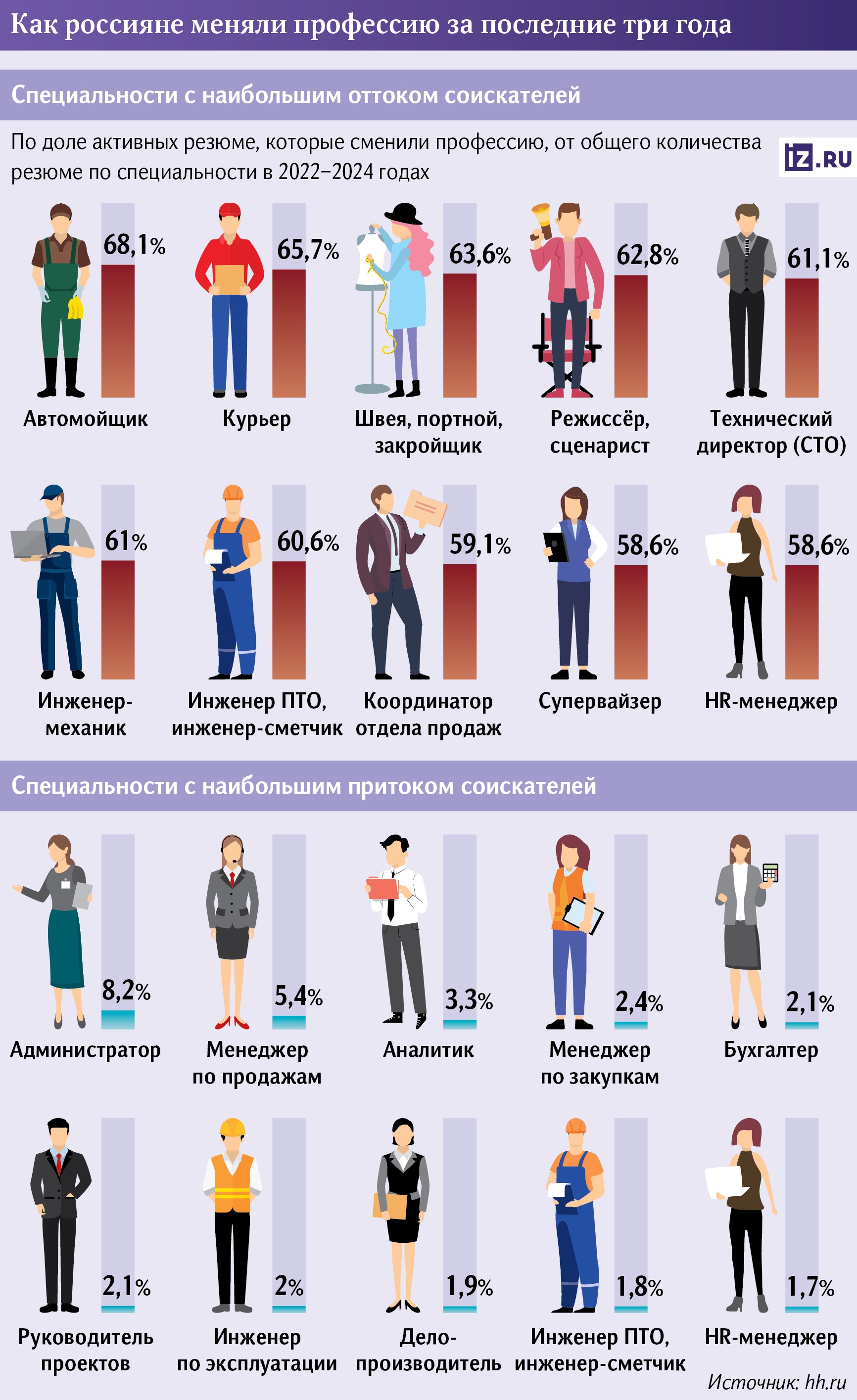Thirst for switching: 40% of Russians have changed professions in three years

Over the past three years, almost 40% of Russians have changed professions, according to hh.ru analysts. Most often car washers and couriers switch from one occupation to another, less often - doctors and accountants. Pandemic, SWO and sanctions changed the labor market, which caused a shortage of staff and a salary race. The trend allows people to earn more, but makes it harder for companies to hire and grow. The pros and cons of changing professions for people and the economy - in the material "Izvestia".
What professions Russians are switching to
Since 2022, 38% of Russians have mastered a new profession, according to hh.ru calculations based on the analysis of 3.4 million resumes (Izvestia has it). This is much more than before: according to a previous study conducted six years ago, between 2009 and 2019, only 30% of Russian citizens changed their occupation.
Most often another profession in the last three years chose car washers, couriers, seamstresses, directors and technical directors - more than 60% of them retrained. At the same time, doctors were the least likely to leave their old profession - only 5%. Geologists, accountants, agronomists and programmers also continued to work in their specialty more often than others - no more than 13% of them preferred a new field, shared in hh.ru.
Meanwhile, the most actively retraining young Russians - from 25 to 35 years old, shared in SuperJob. According to hh.ru, the fastest new specialties in the last three years mastered the inhabitants of the Far East regions, and the least interest to change the profession showed people in Kabardino-Balkaria, St. Petersburg, Dagestan, Moscow and Chukotka - 36% each.
- Not surprisingly, car washers, seamstresses and couriers changed their specialty most often. These professions have low salaries and difficult working conditions. In addition, the entry threshold is low, as you don't need a diploma, and the shortage of staff has led to increased demand for laborers," explained Natalia Milchakova, a leading analyst at Freedom Finance Global.
Also, the professions of courier or car washer are most often perceived as a temporary way to earn money, so after a while workers are looking for a new specialty, said Olga Panina, head of the State and Municipal Management Department at the Finance University under the Government of the Russian Federation. At the same time, according to her, people who have devoted many years to training - doctors, geologists, teachers - remain stable in their professional preferences.
The majority of Russians chose to move to the work of an administrator - 8% of all citizens who decided to change their occupation, according to the study hh.ru. Also in the top professions on the inflow of personnel included the positions of sales or procurement manager, analyst, accountant and project manager.
At the same time, every fifth retrained citizen preferred working and production specialties. Contrary to stereotypes, the IT sphere turned out to be less popular - over the last three years only 10% have mastered such competencies.
As a rule, people chose as a new specialization a job related to the old one. For example, car washers became car mechanics, couriers became drivers, and seamstresses became designers.
Why Russians often change professions
Increasing professional mobility is a global trend, said Olga Panina from the Finance University. But in Russia it is realized especially brightly.
This is due to the fact that since the beginning of 2022, salaries in the manufacturing industry (mainly in the defense sector) began to rise due to the increase in the volume of government contracts. Subsequently, this caused an overflow of personnel into the relevant industry, explained Natalia Milchakova from Freedom Finance Global.
In addition, the economy is being rebuilt due to sanctions - this provokes GDP growth and, as a consequence, an increase in salaries in the market as a whole, the expert said. However, in some spheres and regions it was slower. Therefore, employees preferred higher-paid professions, especially in the context of rapid inflation (in 2024 it was at 9.5%, in 2022 - almost 12%).
Another factor is the growing popularity of remote work after the coronacrisis pandemic, added Andrei Barkhota, PhD in Economics. Flexible employment format has become the most preferred today, as it allows combining several jobs at once and saving time. This option is more suitable for the new generation Z, which is now entering the labor market. According to the expert, it is not uncommon to switch to a new type of activity only because of remote work, without increasing financial conditions.

- An important role is also played by the institution of self-employment, which in Russia has proved to be very much in demand. Often it is not so much about the profession, but about a form of employment that is more flexible and convenient for many people," Natalia Milchakova added.
What are the risks of staff shortage for the economy
On the one hand, a frequent change of profession contributes to the quality of labor resources and economic development, believes Ludmila Ivanova-Shvets, Associate Professor at the Plekhanov Russian Economic University.
On the other hand, high mobility of personnel causes turnover in a number of professions, primarily in the field of skilled manual and machine labor, where employees sooner or later look for a "safe harbor", said Andrei Barkhota. He added: as a result, to smooth the situation, employers are forced to raise wages, often in advance. This creates risks for inflation growth: the population earns more, so consumer demand and household expenditures grow.
- The shortage of personnel, not the price of loans and not even the lack of capacity, is now the main barrier to economic growth, as enterprises themselves say," Central Bank Chairman Elvira Nabiullina said at a State Duma meeting in October.
According to the head of the regulator, Russia has no other way but to increase labor productivity - this will help overcome the shortage of personnel.
Mass change of professions can lead to a shortage of personnel in certain industries and a surplus of specialists in popular areas, believes Yaroslav Kabakov, Strategy Director of Finam Investment Company. According to him, it is necessary to adapt the education system to the new requirements of the labor market.
Переведено сервисом «Яндекс Переводчик»





